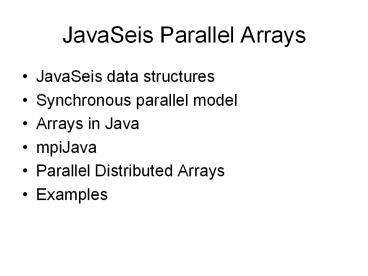JavaSeis Parallel Arrays - PowerPoint PPT Presentation
Title:
JavaSeis Parallel Arrays
Description:
Ken Kennedy, Rice University 1993. Colorado School of Mines. Dave Hale, Mines ... Last dimension is spread across processors (Decomposition, BLOCK or CIRCULAR) ... – PowerPoint PPT presentation
Number of Views:425
Avg rating:3.0/5.0
Title: JavaSeis Parallel Arrays
1
JavaSeis Parallel Arrays
- JavaSeis data structures
- Synchronous parallel model
- Arrays in Java
- mpiJava
- Parallel Distributed Arrays
- Examples
2
JavaSeis Data Structures
- View data as N-dimensional array
- Most common view is a series of 3D volumes
- Use generic names for each axis Sample, Trace,
Frame, Volume, Hypercube, - Associate LogicalNames with each axis
- Time, Offset, X-Line, InLine
- Time, Channel, Shot, Swath
3
JavaSeis Dataset Logical View
Frame
Sample
Volume
Trace
4
JavaSeis Bounding Box
X-Line
InLine
5
Parallel Distributed Objects
Node 0
Node 1
Node 2
Node 3
pdoRead
pdoRead
pdoRead
pdoRead
pdoExec
pdoExec
pdoExec
pdoExec
pdoWrite
pdoWrite
pdoWrite
pdoWrite
6
The Transpose Problem
CPU 1
CPU 0
CPU 2
CPU 3
Local Access
Remote Access
7
Data Parallel Transpose
CPU 1
CPU 0
CPU 2
CPU 3
Local Tile Transpose
8
Arrays in Java
- 1D arrays or arrays of arrays
- Subarrays and multi-dimensional views of a 1D
array are not supported by the language - Subarrays are constructed by passing the full
array and an upper and lower bound - Example reference from Matuszkek, University of
Pennsylvania
9
Design Sources
- NCAR / UCAR NetCDF
- University Center for Atmospheric Research
- High Performance Fortran
- Ken Kennedy, Rice University 1993
- Colorado School of Mines
- Dave Hale, Mines Java Toolkit
- Landmark ProWESS / SeisSpace
- ARCO Parallel Seismic Environment
10
DistributedArray Class Structure
mpiJava
java.lang.Array
TransposeType
IMultiArray MultiArray
ITranspose Transpose
IParallelContext MPIContext
DistributedArray
Decomposition
11
parallel and array packages
- org.javaseis.parallel
- IParallelContext, ParallelContext
- Message passing support
- Decomposition
- Define decompositions for array dimensions across
processors - org.javaseis.array
- IMultiArray, MultiArray
- Containers for Fortran style multidimensional
arrays - ITranspose, Transpose, TransposeType
- Transpose operations for Fortran style arrays
- DistributedArray
- Extends MultiArray to distribute across processors
12
MultiArray Design Targets
- 1D Java arrays of primitive elements or Objects
- A superimposed "shape" that follows Fortran
conventions - Access via "range" triplets (start,end,increment)
- Ranges for Java zero based indexing or Fortran 1
to N based indexing - Access to the "native" storage array for more
arbitrary access - Array "elements" can have multiple values (i.e.
complex, multi-component) - Designed to be extended to provide JavaSeis
DistributedArrays - Allow use of other array utility classes
(java.util.Arrays, edu.mines.jtk.dsp.Array)
13
Transpose Operations
- TransposeType
- Java enum that defines the set of available
transpose operations (i.e. T312, T1243, T21) - ITranspose, Transpose
- Interface and pure java implementation
- In-place 2D transpose is the basic operation
- Extended to 132 transpose for 3D arrays
- Combinations yield full set of 3D transposes
- A single 1243 transpose provided for 4D
14
Message Passing
- IParallelContext
- Interface for the minimal set of message passing
needed to support JavaSeis Parallel Arrays - Send, Receive, getSize, getRank
- Barrier, Broadcast (optional)
- Shift, Transpose, BinaryTree built from the above
- Init and Finish
15
MPI for Java
- mpiJava from Syracuse University (NPAC) selected
for SeisSpace - Java wrappers for native MPI calls
- Support for sending serialized objects
- MPIContext implements IParallelContext
- MPICH for native methods
- Mpirun np 16 machinefile machines.txt java
ClassName arguments
16
DistributedArray
- Extends MultiArray
- Requires IParallelContext for constructor
- Adds distributed tiled transpose (ttran)
- Last dimension is spread across processors
(Decomposition, BLOCK or CIRCULAR) - Transpose operations support arbitrary
distribution of a single dimension - Multiple decompositions possible but not
currently supported
17
Decomposition
- Design concept from High Performance Fortran
- Default decomposition is BLOCK
- Allocates a fixed number of array indices per
node - Remainder is pushed to the edge, NOT evenly
allocated - May result in zero elements on high rank nodes
- Simple start,end indexing with stride 1
- CIRCULAR decomposition
- Round robin allocation
- Remainder spread across nodes
- Good for load balancing
- Permutation logic required to keep track of
indices
18
BLOCK vs CIRCULAR Decomposition 13 array indices
on 4 nodes
141 581 9121 13131
1134 2104 3114 4124
19
Transform - Transpose Pattern
0
1
2
3
Time
0
1
2
3
X-Line
X-Line
InLine
InLine
Frequency
20
Transform - Transpose Pattern
- // Create a 3D distributed array
- DistributedArray a new DistributedArray(
Seis.getParallelContext(), 3, float.class, new
int 512,256,128, Decomposition.BLOCK ) - // Transform x axis of an array in xyz order
- computeTransform1D( a )
- // Transpose to yxz
- a.tran213()
- // Transform y axis
- computeTransform1D( a )
- // Transpose to zyx
- a.tran132()
- // Transform z axis
- computeTransform1D( a )
- // Transpose back to xyz
- a.tran321()
21
Distributed Array Padding
- Decomposition will likely have a remainder that
requires padding - Constructor allocates an array that accounts for
padding - Use constructor with an array of Decompositions
if transpose operations will be used - Index and range methods only traverse the live
section of the array
22
Distributed Array Padding
Padded Array
Decomposition Padding
Partial Array Section
Live Section
23
Planned Additions
- Support for other patterns
- Transpose-Reduce
- Transpose-Overlap
- Arrays of Arrays optional variable length
- floata new float10
- for (int i0 ilt10 i)
- ai new floati
- Parallel Sorting
- Requires variable length array of arrays
24
Reduce - Transpose Pattern
PDO ( x, y f )
PDO ( x, y n )
PDO ( x, n y )
25
The Overlap-Transpose Pattern
Overlap-Expand Locally
Transpose to Distributed Overlap
Distributed array
0
1
2
3
0
1
2
3
0
1
2
3
26
Parallel Data Sort
Sort
27
Parallel Data Sort
Block parallel output
Variable length Transpose and resort within tile































